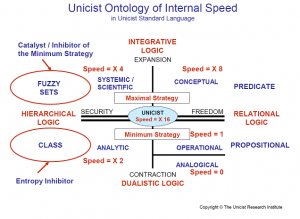The following excerpt is from the Unicist White Paper called “The Unicist Ontology of Internal Speed” by Peter Belohlavek.
Decisions have been made when they have been implemented. Before their implementation they are just hypothetical wishes.
The speed of decision making depends on the type of logical thinking of individuals. It has to be considered that speed is defined by the chronological lap between a new fact and the implemented real action to exert accurate influence. The more evolved the logical thinking of individuals the higher the speed of action:
1) Analogical thinking drives to no decisions because personal needs and beliefs prevail. The speed is “0” (zero).
2) Operational thinking requires making the necessary technical analytical studies to define the problem and the possible solution. This is considered the standard time for decision making.
3) Analytical thinking allows focusing the operational technical analytical studies. This doubles the speed of operational thinking.
4) Systemic (Scientific) thinking focuses on a specific operation which reduces the cost of the preparation of decision making based on the existence of a hypothesis for a solution. This doubles the speed of analytical thinking.
5) Conceptual thinking provides the ontological structure that underlies the operation. It allows defining the essential drivers of the solution. This doubles the speed of systemic thinking.
6) Unicist thinking provides the understanding of the boundaries of the solution allowing the development of a plan B (including an entropy inhibitor) and a plan C (including a catalyst). This doubles the speed of conceptual thinking.
Conclusion
Internal speed cannot be accelerated without producing paradoxical results.
Internal speed evolves with the individual but a sudden acceleration drives individuals towards analogical thinking.
It has to be considered that the mass of the population tends to use analogical thinking at work. Teamwork decisions need to accept that a train has the speed of its slowest wagon (metaphor).

